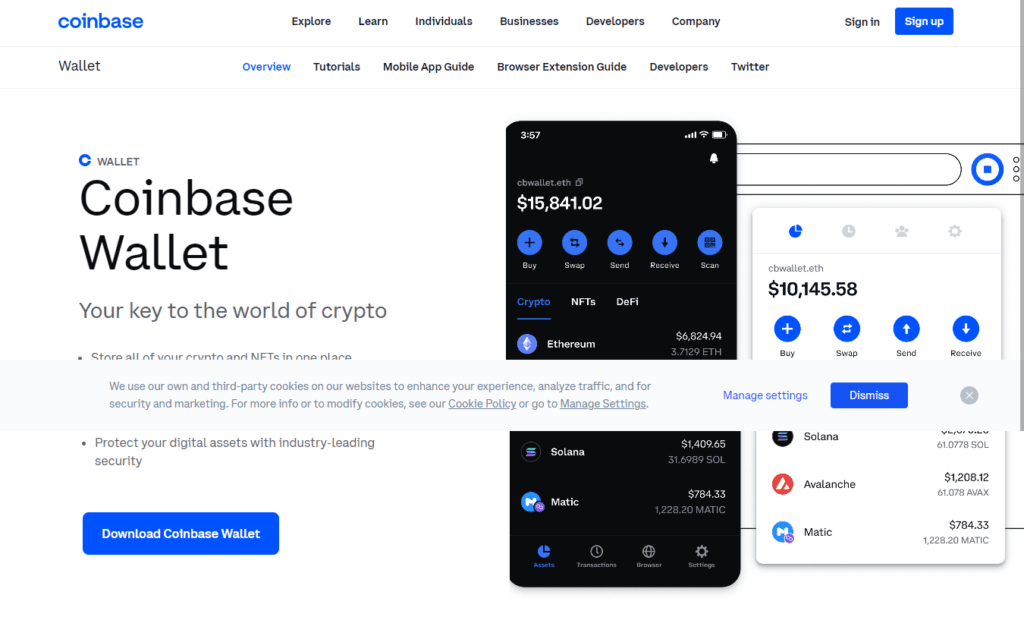Are you looking for the best bitcoin wallet for your crypto uses? Good! In this article, we will list the top 10 bitcoin wallets out there.
Bitcoin wallets are essential for anyone who owns or is interested in buying bitcoin. A wallet is a digital storage space that allows users to store their Bitcoin addresses and access them from other devices.
Since the invention of Bitcoin, there have been dozens of changes in this field and thus many new versions and types of wallets have emerged.
While the most famous and well-known wallets are still available, others have not withstood the test of time and have been abandoned or replaced by newer versions.
Table of Contents
What Are The Best Bitcoin Wallets?
The following are some of the best Bitcoin wallets currently available.
1. Ledger Nano X
The Ledger Nano X is a hardware wallet that is widely considered to be the most secure way to store Bitcoin. It features Bluetooth connectivity and can store up to 100 different cryptocurrencies. Some of its key features include:
- Secure chip technology that protects your private keys
- Two-factor authentication for added security
- Compatibility with popular software wallets like Electrum and Mycelium
- A large, easy-to-read display
Pros:
- Unmatched security thanks to its hardware design
- Compatible with a wide range of platforms and software wallets
- Ability to store multiple cryptocurrencies in one device
Cons:
- Higher price point compared to other wallets
- Requires a computer or mobile device with Bluetooth to use
2. Trezor Model T
The Trezor Model T is another popular hardware wallet that offers a touchscreen interface and supports a wide variety of cryptocurrencies. Its features include:
- Support for over 1,000 cryptocurrencies
- A large touchscreen display
- Multi-factor authentication for added security
- Compatibility with popular software wallets like Electrum and Mycelium
Pros:
- High level of security thanks to its hardware design
- Supports a wide range of cryptocurrencies
- Easy-to-use touchscreen interface
Cons:
- Higher price point compared to other wallets
- Requires a computer or mobile device to use
3. Coinbase Wallet

The Coinbase Wallet is a software wallet that is easy to use and integrates with Coinbase’s exchange platform. It supports both Bitcoin and Ethereum, as well as a variety of other cryptocurrencies. Its features include:
- Easy setup and integration with the Coinbase exchange
- Multi-factor authentication for added security
- Ability to purchase cryptocurrencies directly within the wallet
- Compatibility with other software wallets
Pros:
- User-friendly interface makes it easy for beginners to use
- Integrates seamlessly with Coinbase exchange
- Supports a wide range of cryptocurrencies
Cons:
- Centralized control of private keys may be a concern for some users
- Limited support for other platforms outside of Coinbase exchange
4. Electrum
Electrum is a popular software wallet for desktop and mobile devices that offers advanced security features like multi-signature support and two-factor authentication. Some of its key features include:
- Support for multiple cryptocurrencies
- Advanced security features like multi-signature support
- Compatibility with hardware wallets like Ledger and Trezor
- Ability to customize transaction fees
Pros:
- Advanced security features make it a good choice for experienced users
- Compatibility with hardware wallets for added security
- High level of customization for transaction fees
Cons:
- User interface may be intimidating for beginners
- Limited support for mobile devices
5. Exodus
Exodus is a software wallet that supports a wide range of cryptocurrencies and offers a user-friendly interface with a built-in exchange feature. Its features include:
- Support for multiple cryptocurrencies
- User-friendly interface with built-in exchange feature
- Compatibility with hardware wallets like Trezor and Ledger
- Ability to customize transaction fees
Pros:
- User-friendly interface makes it easy for beginners to use
- Built-in exchange feature makes it convenient to buy and sell cryptocurrencies
- Supports a wide range of cryptocurrencies
Cons:
- May not offer the same level of security as hardware wallets
- Limited support for mobile devices
6. BitPay
BitPay is a mobile wallet that also integrates with BitPay’s payment processing services. It supports Bitcoin and Bitcoin Cash, and allows users to send and receive payments with ease. Some of its key features include:
- Integration with BitPay’s payment processing services
- Support for Bitcoin and Bitcoin Cash
- Multi-signature support for added security
- Compatibility with hardware wallets like Ledger
Pros:
- User-friendly interface makes it easy for beginners to use
- Integration with BitPay’s payment processing services makes it convenient for merchants
- Multi-signature support adds an extra layer of security
Cons:
- Limited support for other cryptocurrencies
- May not offer the same level of security as hardware wallets
7. Mycelium
Mycelium is a mobile wallet that offers advanced security features like local trader integration and support for hardware wallets. Some of its key features include:
- Advanced security features like local trader integration and support for hardware wallets
- Compatibility with multiple cryptocurrencies
- Customizable transaction fees
- Integration with popular exchanges like Binance and Kraken
Pros:
- Advanced security features make it a good choice for experienced users
- Integration with popular exchanges makes it convenient for buying and selling cryptocurrencies
- Customizable transaction fees provide added flexibility
Cons:
- User interface may be intimidating for beginners
- Limited support for iOS devices
8. TrustWallet
TrustWallet is a mobile wallet that offers support for a wide range of cryptocurrencies, including Bitcoin, Ethereum, Binance Coin, and more. It was acquired by Binance in 2018 and is now the official mobile wallet of the popular cryptocurrency exchange. Some of its key features include:
- Compatibility with a wide range of cryptocurrencies
- Integration with the Binance exchange
- User-friendly interface
- Advanced security features like PIN codes and biometric authentication
Pros:
- Wide range of supported cryptocurrencies makes it a good choice for diversifying your portfolio
- Integration with Binance exchange makes it convenient for buying and selling cryptocurrencies
- Advanced security features provide added protection for your funds
Cons:
- Limited support for desktop and browser use
- Centralized control of private keys may be a concern for some users
Overall, TrustWallet is a great choice for users looking for a mobile wallet with a wide range of supported cryptocurrencies and integration with a popular exchange. However, users who prefer more control over their private keys or want support for desktop or browser use may want to consider other wallets on this list.
9. BlockFi

BlockFi is a mobile wallet that offers interest-bearing accounts for Bitcoin and other cryptocurrencies. It supports Bitcoin, Ethereum, Litecoin, and USD Coin. Some of its key features include:
- Interest-bearing accounts for Bitcoin and other cryptocurrencies
- Support for multiple cryptocurrencies
- User-friendly interface
- Integration with popular exchanges like Binance and Coinbase
Pros:
- Interest-bearing accounts offer a unique benefit for Bitcoin holders
- User-friendly interface makes it easy for beginners to use
- Integration with popular exchanges makes it convenient for buying and selling cryptocurrencies
Cons:
- Centralized control of private keys may be a concern for some users
- Limited support for some cryptocurrencies
10. Atomic Wallet
Atomic Wallet is a desktop and mobile wallet that offers advanced security features like two-factor authentication and multi-signature support. It supports over 500 different cryptocurrencies. Some of its key features include:
- Advanced security features like two-factor authentication and multi-signature support
- Compatibility with over 500 different cryptocurrencies
- Customizable transaction fees
- Integration with popular exchanges like Binance and Changelly
Pros:
- Wide range of supported cryptocurrencies makes it a good choice for diversifying your portfolio
- Advanced security features make it a good choice for experienced users
- Customizable transaction fees provide added flexibility
Cons:
- User interface may be intimidating for beginners
- Limited support for mobile devices
Bitcoin Wallets FAQs.
What Are Bitcoin Wallets?
A Bitcoin wallet is a digital storage service for cryptocurrencies, such as Bitcoin. Wallets offer users a way to securely store their Bitcoins, which are stored in the form of private keys that can be used to access and spend coins.
Most wallets also offer additional features, such as the ability to store other cryptocurrencies, transaction history tracking, and support for multiple languages.
What Are The Different Types Of Bitcoin Wallets?
There are four main types of Bitcoin wallets: hardware, software, online, and offline.
Hardware wallets are physical devices that are designed to provide users with extra security and control. They are typically connected to a desktop computer or laptop through USB, although more advanced versions can also be used on mobile devices.
Software wallets offer the same features as hardware wallets but are installed directly on computers or mobile devices rather than physical devices. They are generally considered less secure than hardware wallets, however, because they are more susceptible to hacking.
Online wallets are hosted by third-party websites or exchanges and can be accessed from any internet-connected device. They offer convenience but are generally considered less secure than other types of wallets because they are typically less well-protected against hacking.
Offline wallets are not connected to the internet and therefore offer a higher level of security. They are typically used to store larger amounts of Bitcoin and can be divided into two categories: desktop and mobile.
How Do I Choose A Bitcoin Wallet?
When choosing a Bitcoin wallet, it’s important to consider your needs and preferences. If you’re looking for extra security, for example, you might want to opt for hardware or an offline wallet.
Some wallets also offer additional features, such as the ability to store other cryptocurrencies or provide access to an online exchange. Many also support multiple languages, making it easier for users who don’t speak English to use them
Conclusion
There are a variety of Bitcoin wallets available on the market, each with its own unique features and benefits. The right wallet for you will depend on your individual needs and preferences, such as the level of security you require, the number of cryptocurrencies you want to store, and the convenience of the wallet’s user interface.
Hardware wallets like Ledger and Trezor offer the highest level of security for storing large amounts of Bitcoin, while software wallets like Exodus and Electrum offer a good balance between security and convenience. Mobile wallets like TrustWallet and Edge are great for on-the-go use and ease of access, while web wallets like Blockchain.com offer a simple way to get started with Bitcoin.
No matter which wallet you choose, it is important to prioritize security and take steps to protect your private keys, such as enabling two-factor authentication and storing your backup phrase in a secure location. By doing your research and selecting a wallet that meets your specific needs, you can feel confident in managing your Bitcoin and other cryptocurrencies safely and securely.







